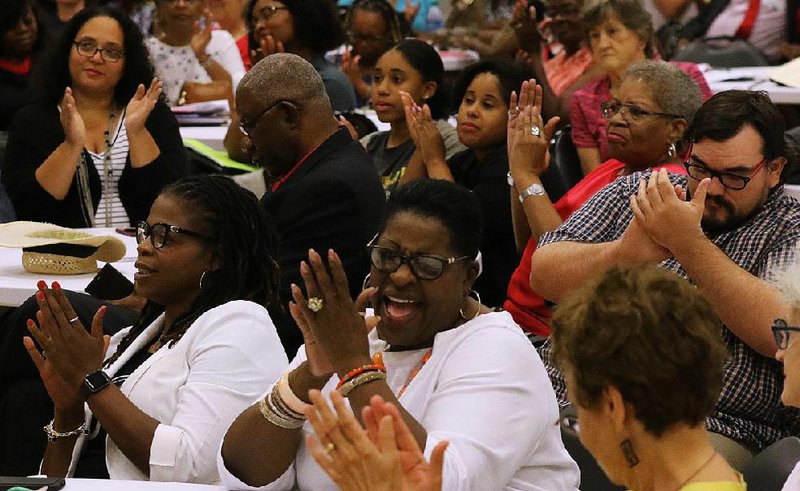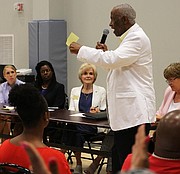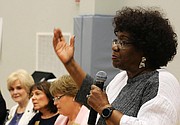The fourth forum in two weeks on the future of the state-controlled Little Rock School District -- this one at Longley Baptist Church on Geyer Springs Road -- again attracted a boisterous crowd of at least 200 Thursday but didn't have the angry bedlam that marked some of the earlier events.
There was even a little hand-holding plus a call for a show of hands from those who might want to serve on an elected school board.
The five members of the Arkansas Board of Education who presided at Thursday's forum went almost directly from a prayer given by the church's pastor to listening to the lineup of more than 20 speakers from the audience -- most of whom called passionately for the return of the Little Rock district to the control of a locally elected school board.
Several of the speakers accused the Education Board and other state officials of failing the Little Rock district while the system has been under its jurisdiction. And there were calls for civil disobedience.
"We believe the level of education we are getting now is embarrassing -- not because of local people but because ... but our monitors ... have not implemented programs that work," audience member Kenny Fisher told the Education Board members.
"At the end of the day, you look at your report card and you tell me, would you hire you?" he asked. "How do we hold you accountable?"
Audience member Genelle Holman told the audience that the time has come to exercise resistance and consider acts of civil disobedience against an Education Board that doesn't disclose its plans.
The Education Board hosts abandoned for Thursday's session any introductory recap of the state law and description of the exit criteria being applied to the Little Rock school system. They also did not attempt to break the audience into small discussion groups to generate ideas about the district's future management. Opposition to the breakout groups at two forums earlier this week contributed to verbal confrontations between Education Board members and some audience members.
Ali Noland, a district parent, spoke first Thursday to dispute the premise that Little Rock community members are fighting amongst themselves. She said that the people who declined to participate in small groups earlier this week stayed together and did put forth a list of ideas.
"We are capable of working together," she said, praising the diversity of the audience and urging crowd members to give one another grace and kindness as they work through the school district's hard issues.
Noland then asked everyone in the church gymnasium to take their neighbor's hand.
"Repeat after me," she said and the crowd cooperated: "We are in this together. We are one Little Rock School District. And we cannot be divided."
Rep. John Walker, D-Little Rock, a civil-rights lawyer who has spent his career challenging what he saw as racially unfair practices in the Little Rock district, told the crowd that he was pleased to see its white members "speaking up for social justice."
He also said the city and the district are divided -- as the result of white families and schools moving away from the city to the city's edges or to surrounding areas of Cabot, Conway and Bryant. He said no Arkansas city can prosper without strong public schools and "we need the return of local control."
The session Thursday was the latest in a series being held throughout the district by the Arkansas Education Board to help determine how the district, which continues to have several academically struggling schools, might be returned to a locally elected school board within the parameters of state law.
The last scheduled forum will be 5:30-6:30 p.m. Tuesday at the Arch Ford Education Building, 4 Capitol Mall. That will be followed by a 6:30 p.m. Education Board discussion on the issue. That event will be livestreamed, Education Board Chairman Diane Zook said.
The community meetings come in advance of the January 2020 expiration of the Little Rock district's five-year deadline to correct its student-achievement deficiencies in order to exit state control, or Level 5 -- intensive support.
Chronically low test scores at six of the district's 48 schools at that time led the state Education Board in January 2015 to assume control of the system by dismissing the locally elected School Board and placing the superintendent under the supervision of the Arkansas education commissioner.
Current state law and accompanying rules call for a district under state control to either meet state-set exit criteria for regaining a locally elected school board or face the permanent "consolidation" or "annexation" of the district to one or more other districts, or be "reconstituted."
Consolidation and annexation of the large district to another district is not considered feasible by most state education leaders. "Reconstituted" -- the third option -- is not defined in state law. That prompted state Education Board members to call for ideas on how the district might be reconstituted in the event the district does not meet all of the exit criteria.
Education Department leaders earlier this year established exit criteria -- both qualitative and quantitative -- for the eight F-graded schools. Those schools are Bale, Romine, Stephens and Washington elementaries; Cloverdale Middle; and J.A. Fair, Hall and McClellan high schools.
Pulaski County Circuit Judge Wendell Griffen and community activist Anika Whitfield have been at the three sessions this week and spearheaded much of the call for an immediate return of a locally elected school board in the school system.
On Thursday, Griffen told the Education Board members that the community has been watching them nearly five years.
"You flunk," he told them repeatedly about the number of academically struggling schools in the district.
"When you are the only political power, you can't blame us for the criteria you failed to meet," Griffen said, adding later that failing to restore an elected board to the district will mean returning the district to the era of the late Gov. Orval Faubus and segregation.
The quantitative criteria call in part for the number of students scoring at the "close," "ready" and "exceeds ready" categories of achievement on the literacy and math portions of the Aspire test to exceed the number in the lowest "needs to improve" achievement category.
Other quantitative criteria for each of the eight schools is a score of 80 or better in a calculation of student achievement growth in literacy and math over time. An 80 score indicates that the students at the school at least matched the overall achievement growth from the previous year -- be it a year's worth of growth or something less or greater than a year's growth.
The exit criteria also call for the district to demonstrate sound management practices and meet state expectations on instructional programs and strategies.
The latest data on achievement growth as well as revised state letter grades on Little Rock schools and all other public schools in the state are due out by mid-October.
Sens. Linda Chesterfield, Joyce Elliott and Will Bond, all Democrats from Little Rock, each took a turn at the microphone Thursday.
Chesterfield said the district has already been reconstituted by the siphoning of district students to independently operated charter schools and by the application of state-issued A to F letter grades. Telling people often enough that they are failing can be a self-fulfilling prophecy, she said.
Elliott called for the Little Rock district residents to commit to creating for themselves -- and not waiting on anyone else to do it -- a world-class school district that goes beyond adequacy. She argued that the call for "school choice" is about division.
"I know there is discussion of charter schools," she said. "We don't want to be divided,"
Bond said there is no legal reason why the district cannot be returned, intact, to a local board in a community that would work in unity to help struggling students and schools.
"Breaking up the district is a terrible idea," he said, calling for a stop to blaming teachers and instead give them world-class training and pay.
Audience member Michael Mills told the Education Board members that they have lost the trust of the community in part because of slanted polling questions, culturally insensitive standardized testing of students and piecemeal release of new initiatives without adequate time to implement them.
State Education Secretary Johnny Key, who acts as the school board for the Little Rock district, was not in attendance at Thursday's meeting nor at the previous three meetings, although his staff members from the state Division of Elementary and Secondary Education attended the meetings.
Metro on 08/30/2019



